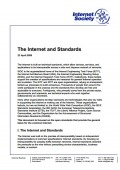The Internet is built on technical standards, which allow devices, services, and applications to be interoperable across a wide and disperse network of networks.
The Internet Society is the organisational home of the Internet Engineering Task Force (IETF), the Internet Architecture Board (IAB), the Internet Engineering Steering Group (IESG), and the Internet Research Task Force (IRTF). Collectively, these bodies support the creation of specifications and research for general Internet operation and evolution. The IETF and IRTF are open organisations, relying on transparent, bottom-up processes to build consensus. Thousands of people from around the world participate in the process and the standards they develop are free and accessible to everyone. Participants, who primarily come from the private sector, governments and academia, are technical experts who work together collaboratively as volunteers.
Many other organizations develop standards and technologies that play key roles in supporting the Internet or making use of the Internet. These organizations include, but are not limited to, the World Wide Web Consortium (W3C), the IEEE Standards Association, the ISO ANSI, the European Telecommunications Standards Institute (ETSI), the ITU-T, the Liberty Alliance Project, Open Source Communities, and the Organization for the Advancement of Structured Information Standards (OASIS).
This document is focused on the open standards that provide the general basis for the common Internet.
